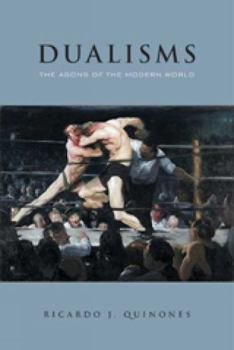Dualisms: The Agons of the Modern World
Dualism is a motif that runs through literature of all genres and historical contexts, inspiring argumentation at the highest level and showing the formation of ideas in association as a creative exchange. It arises with special pertinence in western literature since the Renaissance and Reformation. In Dualisms, noted scholar Ricardo J. Quinones considers four major intellectual encounters: Erasmus and Luther, Voltaire and Rousseau, Turgenev and Dostoevsky, and Sartre and Camus. These four instances, Quinones argues, are important for what they are and what they represent: major intellectual contests that created the modern era and remain the 'agons' of our time.
Through in-depth analysis, this study looks at the clarifications that emerged from four famous polemics. Discerning an 'itinerary of their encounters, ' Quinones suggests a shared paradigm of development that is true for each of the examples of dualism. In all four cases, the two participants represented the vanguard of their time, and all of the debates started from shared intellectual positions until subsequent events revealed substantially different temperaments. It is the inescapable tension and connection between prior affinities and the discord of debate that continue to intrigue us.
Dualisms is a tour-de-force, encompassing intellectual history, philosophy, theology, and literary criticism. It provides fresh perspectives on some of the most famous intellectual debates in all of literature, and considers the implications that they continue to have for the study of the humanities in the modern world.





